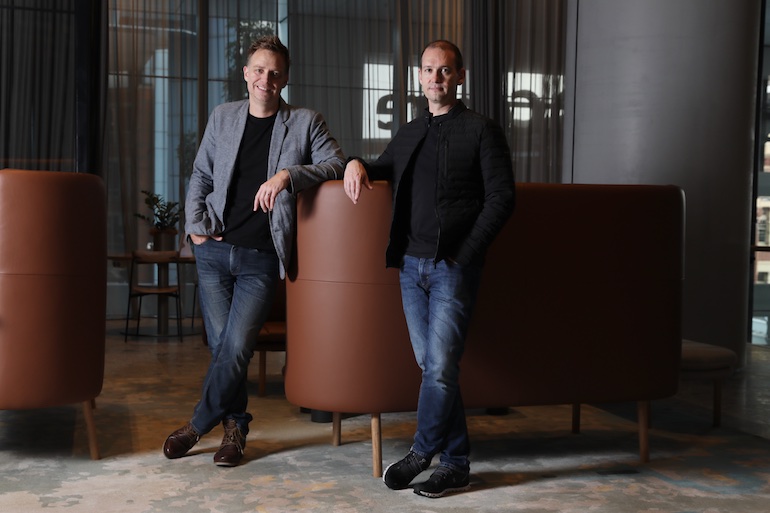It’s a year since multi-currency payments startup Paytron raised a $4.35 million seed round as it launches it product for the SMB market.
Co-founders Jaco Veldsman and Francois Henrion set out to address the pain point of small businesspeople dealing too much paperwork to manage their international payments, and they’ve spent the past 12 months building out a comprehensive payments platform for SMEs and accountants.
Last June, they had 3 full-time employees and bold ambitions to disrupt the archaic payments sector.
Now they’ve grown to 30 people helping a rapidly expanding customer base. The roadmap ahead includes a new corporate card feature, launching in the UK and enhancements to the existing products.
Veldsman and Henrion say “it’s been one helluva year” for Paytron.
“It’s not been easy and the journey over the past 12 months has taught us a lot,” they said.
“There’s a lot we’re still learning but that makes it all the more exciting.”
So we wanted to know what they’d learnt as the founders of an early stage fintech.
Here’s are the lessons they’re keen to share.
2 ears, 1 mouth – listen twice as much
“At the start, we thought we knew exactly what our customers wanted. We built and built and built and wondered why these features and enhancements weren’t being adopted. This resulted in frustration all around, from us and from our developers.
“In hindsight, this was an obvious mistake. What led us to get our seed funding was listening to our ideal customer and focusing our efforts on their biggest pain points. Piece by piece. Nowadays this methodology is engrained in our DNA.
“We won’t build unless there’s strong customer demand, and we’ve scoped out the work.”
Build it & they will come… doesn’t work. Pivot fast
“We started Paytron after working a collective 40 years in investment banking.
“We met through a mutual acquaintance and started doing consulting work together on an SME client where we saw how manual their business payments were.
“We were shocked at how they pieced together 5-6 different apps to manage their business payments. This consulting work led us to build Paytron, with a ruthless focus on alleviating pain points across all facets of payments – accounts payable, receivable, international payments, payroll, and expense management.
“We’ve been able to grow our customer base significantly by never assuming what customers want and actually asking. The benefits of listening and customer obsession mean it’s much easier to know when you’re wrong and need to pivot. “
Hire a solid team – and trust them
“We’ve hired well and haven’t hired well. What we’ve learned is that, as a startup, we need to hire people that can roll up their sleeves, get stuck in and don’t have egos.
“At the start, we assumed that people that came from well-known businesses were the right kind of people and put faith in their ability to be self-starters.
“However, over time we have realised that the transition from corporate to start-up is much harder than most people think. Now when we hire, we look for hunters, not farmers.”
Don’t get distracted by shiny things
“At the start, we tried being everything to everyone. We got distracted by what our competition was doing, or by reading about innovations in payments in other countries.
“We rapidly learned that we need to focus on what would make life easier for our customers.
“Yes, we needed to keep an eye on the competition, but we wouldn’t succeed if we were chasing all the time. “
Juggle, but don’t drop the ball
“In a growing business, it gets harder and harder to juggle. As the team grows, the work changes, and you’ve got new challenges.
“It’s true to say that we suffered a bit from ‘founder syndrome’ and found it hard initially to let go of things that we previously had on our ‘to-do’ list.
“Now our focus is on ensuring the team is on the same page and helping out wherever we can.”
Be ballsy
“Founders are by nature, quite ballsy. You’re likely leaving an established brand, healthy paycheck and a very stable environment into a very different world.
“This new world is plagued by uncertainty and constant challenges from external factors.
“Counterintuitively, to survive you need to take risks which on balance improves your probability of success.”
Ask for help when you need it
“We don’t have all the answers, and we’re ok with that.
“When we got our seed funding, we carefully selected the VC and angel investors we wanted to work with.
“We were after more than money, we wanted guidance in areas where we weren’t as strong.”
Celebrate the wins
“It’s important to stop, pause and celebrate the amazing accomplishments across the company.
“From where we were as a company, and as product 12 months ago, versus where we are now, it’s crazy to see how far we’ve come.
“At times you feel overwhelmed with what you haven’t done, but then look back and realise how much you have achieved and get another injection of excitement and enthusiasm about the future.”
Pick your battles
“Be ruthless with your time. We were always used to growing business with constrained resources but doing it in a start-up is next-level challenging.
By its nature, growing a start-up is an iterative process that in its own right contains inefficiencies.
“You simply can’t afford to spend your own time or the time of your team on tasks that don’t move you forward and closer to your next goal.”




















Trending
Daily startup news and insights, delivered to your inbox.